One of the most fascinating relationships in all of Twin Peaks is that between Bobby Briggs and his father, Major Garland Briggs. Father/son relationships—especially those involving teenage sons—can be fraught, but Bobby and the Major are on a different level. Each of them, in their own way, is filled with secrets, and (for various reasons) they are completely unable to communicate. From the very beginning of the original series, we can see that, while not nearly as bad as the Palmer family’s, the Briggs family has their own dark secrets.
[For the purposes of this article, I will be using the original episode naming system: “Pilot,” then “Episode 1,” etc.]
The Major Briggs we meet at the beginning of the original series, specifically in Episode 1, is a completely different man than he will be by the end of Twin Peaks Season 2. We briefly meet Major Briggs in the Pilot, but we don’t get much of an idea of who this man is. We only see him in a nice little domestic scene in his kitchen, with his wife, Betty Briggs, massaging his shoulders before receiving a call from Sarah Palmer asking after Laura’s whereabouts. The first real glimpse we get into the Major’s personality comes in Episode 1, during the Briggs family dinner scene. After saying grace, Major Briggs attempts to get Bobby to open up to him given all that has just gone on: Laura’s murder, in addition to his bar fight at The Roadhouse and subsequent arrest.
From the beginning of the series, we see Bobby acting like an insolent, cocky teenage boy. He has no respect for authority, which is apparent in the way he acts when the police (and later Agent Cooper) question him in relation to Laura’s death. While Bobby is not as egregiously insubordinate to his father as he is to the cops, he does push back against the Major as well. He takes a different tactic with his father, though. Instead of mouthing off and being a smartass, Bobby is completely closed off and silent.
During the Episode 1 dinner scene, the Major tries to connect with Bobby, but the way he expresses himself is so incredibly formal (which is completely in character for a military man such as the Major) that it seems almost insincere. This is not the language one might expect from a father sincerely trying to relate to his son on an emotional level. He even uses Bobby’s full first name when he addresses him.
In an attempt to get Bobby to talk about his feelings, the Major states:
Robert, I was hoping we’d have a chance to discuss the events of the past few days. Not necessarily the physical events themselves, but rather the thoughts and feelings surrounding them. Rebellion in a young man your age is a necessary fact of life. Candidly, a sign of strength. In other words, Robert, I respect your rebellious nature. However, being your father, I am obligated to contain that fire of contrariness within the bounds established by society as well as those within our family structure. Robert, I note your reluctance to enter in a dialogue with me, your father. There are times when silence is golden. Silence can be taken many ways, as a sign of intelligence. The quieter we become, the more we hear.
Bobby is listening but he’s not even remotely interested in what his father is saying. At this point, he puts a cigarette in his mouth, and this is the last straw for the Major. Seeing him with the cigarette dangling from his mouth at the dinner table, the Major slaps Bobby so hard across the face that his cigarette goes flying and lodges itself in a slice of meatloaf in front of Bobby’s mother, Betty.
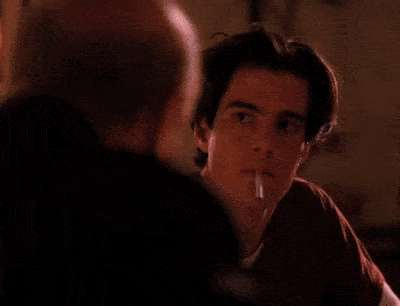
This comes as a shock, both to Bobby and to the viewer. There is never any reason to raise a hand to your child, however frustrated you might be with them, and Bobby’s look of shock (but not horror) tells us that this is likely not the first time that the Major has used corporal punishment out of frustration. After slapping Bobby, who still has not spoken a word, the Major continues:
Now I am a tolerant man, but my patience has its limits. To have his path made clear is the aspiration of every human being in our beclouded and tempestuous existence. Robert, you and I are going to work to make yours real clear.
Betty’s response is interesting to note. She is shocked by the slap, which pretty much came out of nowhere during an otherwise calm conversation, but she barely responds to it. She doesn’t make a peep when it happens and allows the Major to continue his one-sided conversation without interruption. All she does is pull the cigarette out of her meatloaf and say, “We’re here for you, Bobby,” in her usual cheery, maternal way. What this says to me is that Betty is used to this type of thing and that she feels that there is nothing she can say or do to stop it. I don’t believe that she is pro-corporal punishment, and she would certainly never hit Bobby herself, but I do think that she allows the Major to do what he feels he must do in order to try to get their son in line. The Major is very much the patriarch of the Briggs household—a towering presence in her life and in Bobby’s life. Betty’s role in the Briggs family is a supporting one, and so she plays the role of loving wife and mother, ignoring the fact that an act of domestic violence has just occurred at her dinner table.
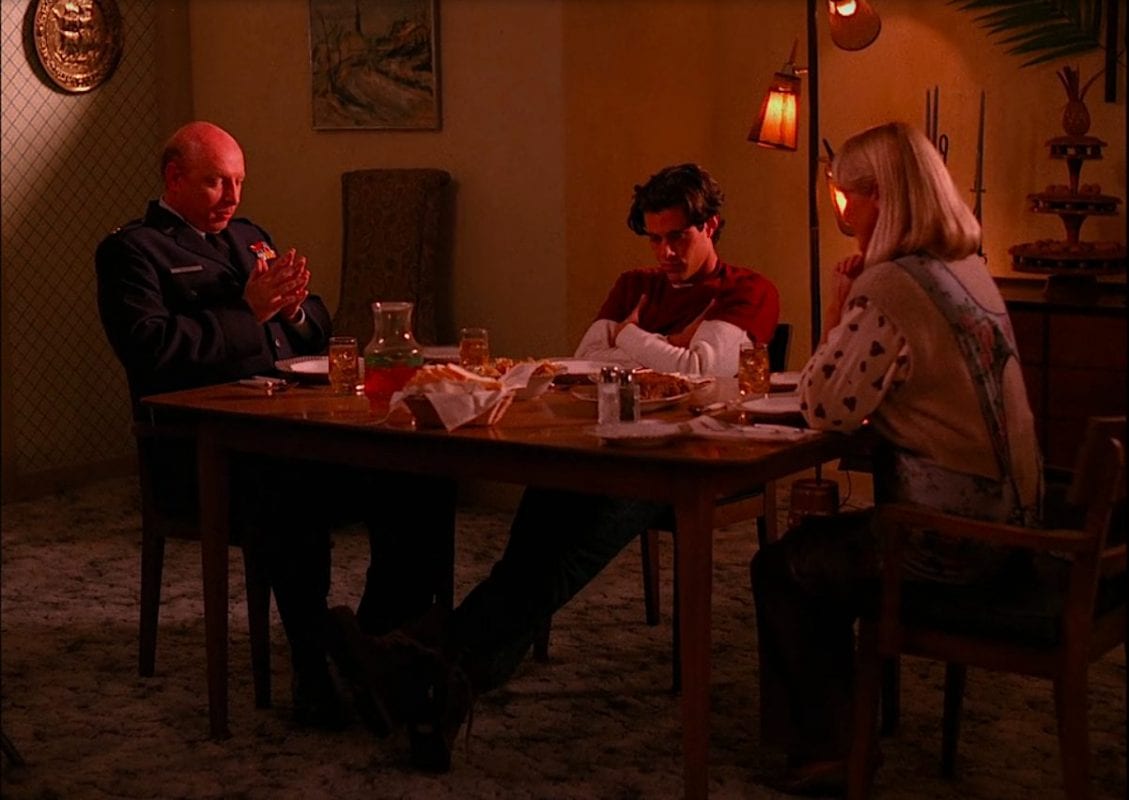
This act of abuse (and however many may have come before it) only serves to make Bobby more distant from his parents at a time when he needs love and support the most. While I don’t think that the Major is a monster or that he has ever done more than spank or slap Bobby out of frustration or as punishment—using the type of “old school” parenting tactics he would have learned from his own parents—the fact remains that he used physical force when he failed to produce the desired outcome with his words. At no point does he apologize for this, either; he just continues to try and engage Bobby in conversations about his feelings, seemingly oblivious to the fact that his entire approach is just driving Bobby further and further away.
This is evident in the scene in Episode 3 in which the Briggs family is preparing to attend Laura’s funeral. The Major tries yet again to have a conversation with Bobby, this time touching on the subject of death and the need for closure:
MAJOR BRIGGS: I’ve attended my share of funerals. Too many. Any time a man dies in war, he dies too soon. Laura died too soon as well.
BOBBY: Yeah, she did.
MAJOR BRIGGS: But we have a responsibility to the dead, Robert. Responsibility is the linchpin of our society. Each man responsible for his own actions. Each action contributing to the greater good.
BOBBY: What’s the good of putting someone in the ground?
MAJOR BRIGGS: It’s man’s way of achieving closure. In ceremony begins understanding, the will to carry on without those we must leave behind. Robert, in your life you must learn, you will learn, to carry on without them.
BOBBY: Great.
MAJOR BRIGGS: I realize you experience an ongoing disinclination to enter fully into meaningful exchange. This leads to stalemate and the desire on my part to force certain wisdom upon you. This isn’t necessarily a bad thing, sometimes it’s the best course available. Son, don’t be afraid. We’ll all be there together.
BOBBY: Afraid of what?
MAJOR BRIGGS: Of the funeral.
BOBBY: I’m not afraid of any damn funeral. Afraid? I can hardly wait. AFRAID? I’M GOING TO TURN IT UPSIDE DOWN!
Knowing what comes next—Bobby’s outburst at the funeral, in which he takes the town of Twin Peaks to task for their role in Laura’s death—it is interesting to think about whether Bobby knew at this point that he wanted to say something at the funeral, or whether this conversation with his father was the catalyst for his actions later on. Bobby does not take it well when the Major claims that he is afraid, but he is afraid (though not of the funeral itself). Bobby has plenty of things to be afraid of, none of which he can share with his father, but he also does not want to appear weak in front of him. To Bobby, that fear signifies weakness even though the Major is trying to communicate the exact opposite: that fear is a natural emotion and can be dealt with through the support of family.
Given what Bobby’s life has become since he got involved with Laura Palmer, he is too far gone to be able to open up to his parents about his troubles even if he wanted to. Major Briggs is the epitome of law and order, and he has a very strict moral code. Bobby’s involvement with drug running (and, as we learn in Fire Walk With Me, the fact that he killed a man in self-defense) would make it impossible for him to feel safe being truly honest with his father about all the trouble he’s found himself in. Bobby truly has no one left in the world with whom he can be honest and open. Despite the emotional and psychological trauma that she caused him, at least when Laura was alive, Bobby had someone who knew what he was going through—even if she was in no position to help him (and was, in fact, the reason why he was suffering so greatly).
With Laura gone, Bobby is left all alone with his secrets (and with some of Laura’s). He has Shelly, sure, but that relationship is incredibly complicated given his history with Leo and the fact that Shelly is still married to a man who Bobby knows is incredibly dangerous and violent—both to those who cross him and to his own wife. I have to wonder if, in some way, Bobby is drawn to abused women. While he didn’t know that Laura was being abused, he certainly knew that she was living a nightmare of some kind. With Shelly, he knows that Leo doesn’t treat her well, and he soon also learns that Leo physically abuses her. I am in no way putting Bobby’s domestic troubles with the Major on the same level with the violence that Laura and Shelly endured, but I think that on some level Bobby is drawn to women that he thinks (or hopes) he can save.
By the end, he knew he couldn’t save Laura. We learn as much during his therapy session with Dr. Jacoby in Episode 5. Initially, it is meant as a family counseling session with Bobby, Betty, and the Major. Bobby’s parents are hung up on trivial things typical of any moody teenager, but Dr. Jacoby knows that there is far more going on under the surface with Bobby Briggs. Jacoby’s relationship with Laura has given him insight into Bobby Briggs that no one else, least of all his parents, has. Before Jacoby clears the room and has his one-on-one session with Bobby about Laura, there is an interesting exchange between Bobby and the Major. Bobby asks Jacoby, “Have you ever killed anybody? My father has.” Major Briggs responds that it was during wartime, and Betty backs him up by saying that it’s different, but Bobby isn’t convinced. “Different than what?” he asks, and this is when Jacoby cuts off the conversation and suggests that he have a private session with Bobby.

Bobby knows very little about what the Major’s job entails, but he does know that he killed people during wartime. It is interesting to think about how Bobby, who has also taken a life under circumstances where it was justified, might feel about his father’s military service and the things the Major had to do. I also have to wonder, given that the Major is always stating that the nature of his current work is classified, if Bobby thinks that maybe part of that top-secret stuff he’s doing involves loss of life in some capacity. What we do know is that Bobby has no idea what his father actually does, and when we don’t know something, our mind can fill in the blanks with the most outrageous possibilities.
Bobby is aware that his father is a very strange man, but he experiences this firsthand when the Major shares with Bobby a vision that he had. This scene in Episode 8 represents a turning point, both in their relationship and in Bobby’s entire life trajectory. It is significant to note that this conversation occurs just after Bobby and Shelly say “I love you” for the first time, while she is in the hospital recovering from the injuries sustained during the mill fire. Shelly says “I love you” to Bobby, but Bobby’s response is a bit off: “I guess…I love you too. Yeah, I guess I love you too.”
It’s not the most romantic way to go about it, but for Bobby this is an incredibly significant moment. Bobby carries emotional scarring after his experiences with Laura, who (as we learn in The Secret Diary) forced herself to laugh at Bobby when he expressed his love and devotion to her after they made love for the first time. Saying “I love you” to a woman (and meaning it) is a huge step for Bobby. Even though Shelly said it first, there is a still a huge feeling of vulnerability in saying those words to another person, and Bobby was finally able to overcome the trauma he experienced with Laura and truly be with Shelly.
So, in this frame of mind, Bobby goes to the Double R where he sees his father sitting in a booth. The Major asks Bobby to join him, and he does so, and initially their conversation consists of the usual banalities—how was school, how was work, etc.—but very soon the Major decides to open up to Bobby about a vision he had. Here, he refers to him as Bobby, not Robert, which is a significant change from previous conversations.
Bobby, may I share something with you? […] A vision I had in my sleep last night. As distinguished from a dream, which is mere sorting and cataloging of the day’s events by the subconscious. This was a vision, fresh and clear as a mountain stream. The mind revealing itself to itself. In my vision, I was on the veranda of a vast estate, a palazzo of some fantastic proportion. There seemed to emanate from it a light from within this gleaming, radiant marble. I’d known this place. I’d in fact been born and raised there. This was my first return. A reunion with the deepest wellsprings of my being. Wandering about I noticed happily that the house had been immaculately maintained. There’d been added a number of additional rooms but in a way that blended so seamlessly with the original construction one would never detect any difference. Returning to the house’s grand foyer, there came a knock on the door. My son was standing there. He was happy and carefree. Clearly living a life of deep harmony and joy. We embraced, a warm and loving embrace, nothing withheld. We were, in this moment, one. My vision ended, and I awoke with a tremendous feeling of optimism and confidence in you and your future. That was my vision of you.
The Major’s words bring Bobby to tears, and the two shake hands before the Major leaves the Double R. This vision is hugely significant in both the Major’s life and in Bobby’s life. The trajectory of their relationship from this point forward is only positive. What the Major has seen in his vision—Bobby’s future (a future we will learn much more about in The Return)—has convinced him that his wayward boy will turn into a good man. Bobby can see that his father has a newfound confidence in him and that he truly does love him. From this point forward, Bobby is a bit less of a punk (although he’s still got a long road to travel to become the man he is in The Return).
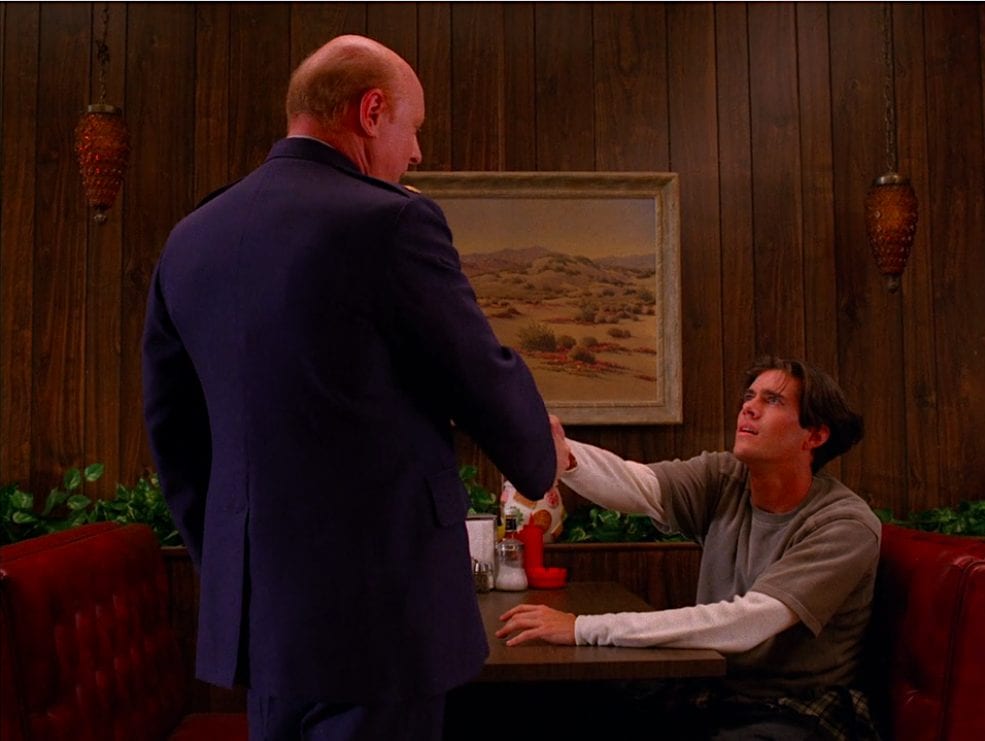
We can debate for ages whether or not the place the Major saw in his vision is, in fact, the place where The Fireman and Señorita Dido reside in The Return (I believe it is), and whether that space is the White Lodge (I believe it is). Believing, as I do, that the Major saw the White Lodge in his vision, it is interesting to think about what that means in terms of the Major claiming that it was the place he was born and raised. As always, there are more questions than answers when it comes to Twin Peaks, but what we do know is that the Major’s vision kicks off a chain of events that will culminate in adult Bobby’s pivotal role in the events of The Return.
I believe that the Major is changed by this vision, but even more so by his abduction in Episode 17. While camping with Agent Cooper, just after he references the White Lodge, Major Briggs is abducted and goes missing for two days. When he returns, after a tearful reunion with Betty and Bobby in Episode 19, he speaks with Agent Cooper and Sheriff Truman about his experience in Episode 20. The Major barely remembers anything about it save for one thing: a giant owl. He states, “Everything is known to me, yet somehow beyond my reach.” When Harry asks him about his work, the Major says it’s classified, but this experience has changed the way he feels about the nature of this information. He says, “the keeping of secrets seems less meaningful to me now. Perhaps there are sources of information that are so important as to transcend the human need to conspire.”
The experience of his abduction has given him great knowledge that he cannot consciously access, at least not yet. He does share some details with Agent Cooper and Harry about Project Blue Book and his continued involvement in it despite it being technically disbanded in 1969. He tells them that his work involves searching for the White Lodge, but just as soon as he gets the words out, he is silenced by the military police who arrive to question him about his disappearance. After this, the Major begins to distrust the military that he had served in his entire life. In Episode 21, he relays these concerns to Cooper and Harry:
When my superiors questioned me about my disappearance, they exhibited a degree of suspicion and intolerance bordering on the paranoiac. I must now admit that their motivation in the search for the White Lodge is not ideologically pure. I believe that during my disappearance, I was taken to the White Lodge. I can remember virtually nothing, but I have the clear, intuitive sense that there is much trouble ahead.
He then tells them that he’ll be “in the shadows” should they need him. At this point, I believe that the Major’s “clear intuitive sense” given to him by his experience in the White Lodge is what eventually enables him to know the details he will need to provide to future Bobby to find during the timeline of The Return. At this point, the details are unclear, but after Major Briggs is kidnapped by Windom Earle in Episode 27 and shot full of Haloperidol, I think the drug shakes some of the memories of his experience loose and provides him with the knowledge necessary to carry out his role in all things to come. At this point, it seems to me that he knows not only that Bobby will turn out to be a good man, but that he will play a role in combating whatever trouble lays ahead.
It is fairly soon after this that the Good Dale gets trapped in the Lodge and Major Briggs is visited by DoppelCooper. We learn in Part 9 of The Return that, immediately after Cooper’s visit, Major Briggs gave Betty a set of incredibly specific instructions for future Bobby to follow. At this point, he knew exactly what was coming, along with his role in it and Bobby’s role in it. He must also have known he was about to die (or at least start the interdimensional journey that would culminate in his actual death at some point outside of time). In any case, he knew he would not be seeing his family again, but he was able to give a final gift to Bobby, even if he would not receive it for many years. Part of this gift is Betty’s words to Bobby in Part 9:
Right after Agent Cooper left that day, Garland pulled me aside, and he said that one day our son Bobby, and Hawk, and Sheriff Truman—I didn’t know it would be this Sheriff Truman—he said that they would come and ask me about Special Agent Dale Cooper. He squeezed my shoulders when he told me this. I tried to ask him what it was about, but he wouldn’t say any more. He just said, “When they come to ask you about Agent Cooper, you give them this.” And now you’re here. This is the chair. I can’t believe this day has come. Watch right here. Bobby, when your father told me this, you were a very long way from where you are today. Somehow, he knew that it would all turn out well. He saw this life for you. Your father never lost faith in you.
This is deeply moving to Bobby, and he tears up. What Betty tells Bobby is analogous to the Major’s vision in that it assures Bobby that his father, despite their differences, always did love him and was able to draw on his various otherworldly experiences and intuition in order to look past what Bobby was and focus on what he could be—or rather, what he knew he would be.
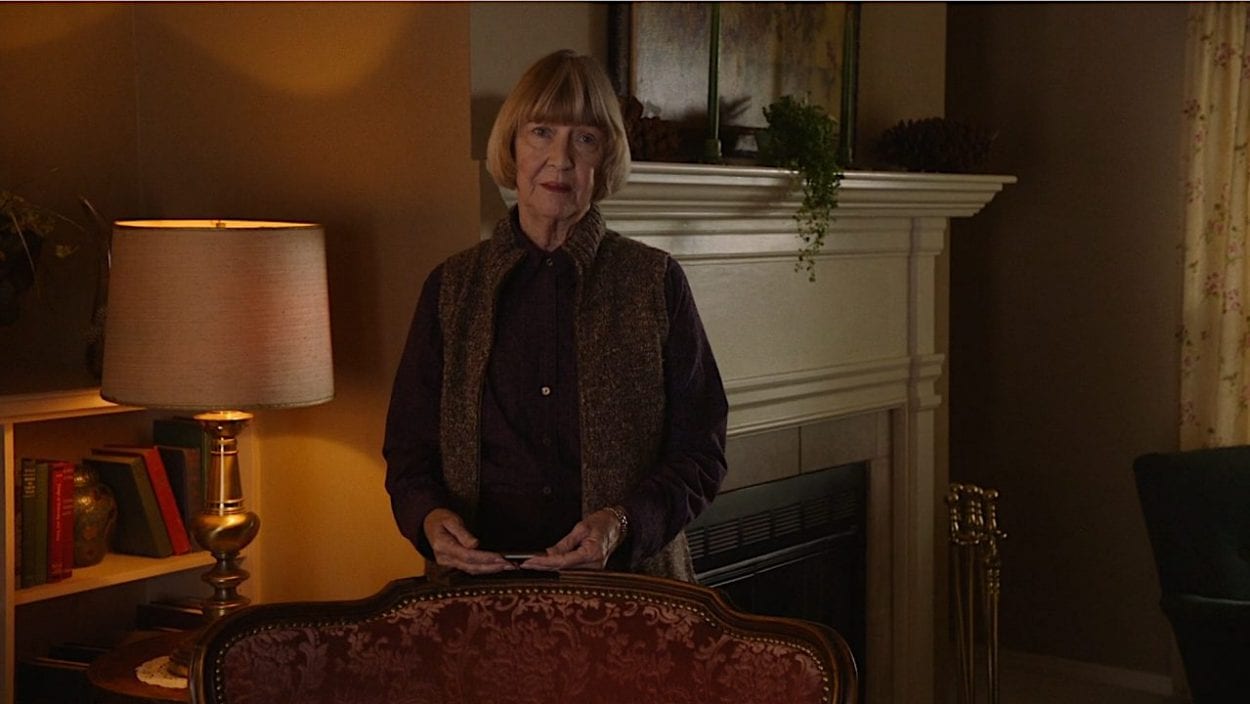
The second gift that Major Briggs gives Bobby is to make him absolutely invaluable in the investigation into Agent Cooper’s disappearance. The capsule he placed in the chair all those years ago is something that only Bobby would know how to open; the landmark of Jack Rabbit’s Palace is a location that only Bobby would know. As Bobby starts to realize these things, we can see the satisfaction on his face. This is not the cockiness associated with young Bobby Briggs, but a grown man who is learning to be at peace with himself. Bobby has carried some Daddy Issues with him all his life, as his father died/disappeared without the two ever really having hashed out their differences. What the Major is providing Bobby here is that sense of closure that he needs—proof positive that, in the end, his father both loved him and trusted him to do the right thing when the time came.
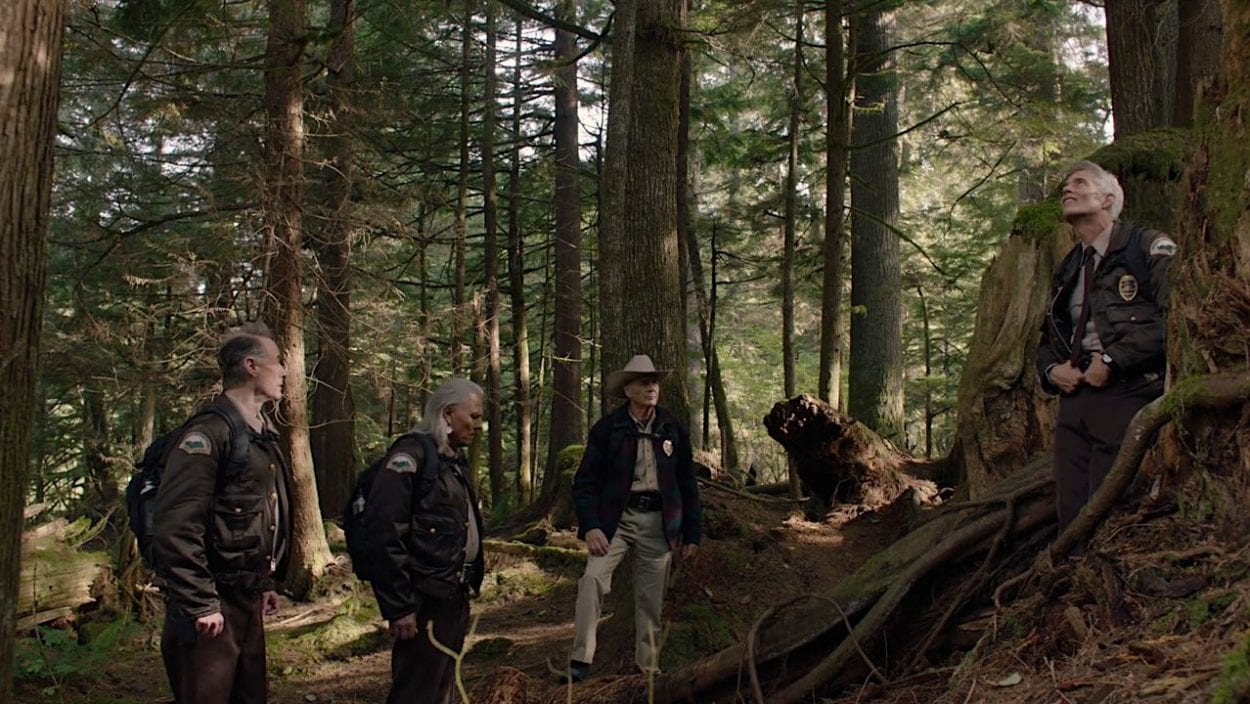
When Major Briggs was drugged by Windom Earle and asked what his greatest fear was, his response was: “The possibility that love is not enough.” I think what we see in The Return through Bobby’s character arc is that, in the end, the Major’s fear was unfounded. Love was enough. The Major’s love for Bobby was the key to unlocking the mystery, and even though Bobby had an incredibly complicated relationship with his father, in the end there was no bitterness. There was only love.

